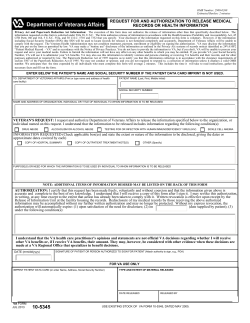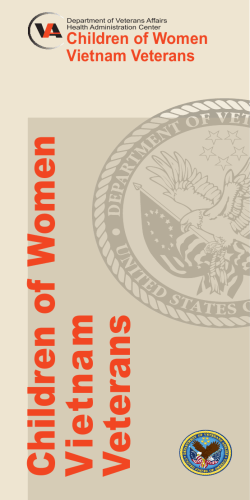
What is a Veteran’s Treatment Court?
What is a Veteran’s Treatment Court? 601 Roxbury Road Shippensburg, PA 17257 Toll-Free: 1-800-648-HOPE (4673) Admissions: 717-530-2206 Fax: 717-532-2109 Spring 2014 Managing Stress Helps Build Resilience By following some simple guidelines to keep your body and mind healthy and strong, you can build your resilience and enable yourself to deal with stress in healthier ways. • Rest • Plan your time • Get physically active • Eat healthy • Get enough sleep • Talk to family and friends • Reach out for help if you need it Tactics for coping with difficult situations: • Counting to 10 and taking deep breaths • Talking about your options with someone you trust • Diverting your attention by taking a walk • Participating in relaxing activities to regain composure • Writing your thoughts down in a journal Avoid coping with difficult situations by: • Drinking excessively • Taking “video valium” (i.e., zoning out in front of the television) • Avoiding responsibilities • Isolating yourself • Neglecting to talk about the situation • Overeating • Refusing to make decisions To read the full article, please visit: http://www.realwarriors.net/veterans/treatment/p ostdeploymentstress.php roxburyhospital.com Veteran’s Treatment Courts were founded in New York in January 2008 after a severe increase in the number of veterans who were involved in both Drug and Mental Health Courts. Judge Russell, who founded the first Veteran’s Courts, witnessed the positive impact of military camaraderie as veterans assisted fellow veterans in navigating the behavioral health system. He further recognized the importance of getting veterans connected to the appropriate programs, benefits and treatment services. This recognition of the value in connecting military and veteran populations to others with similar needs led to the creation of Veteran’s Treatment Courts. Veteran’s Treatment Courts work in collaboration with the prosecutor, defense counsel, treatment provider, probation officers and law enforcement agencies. They admit only those veterans who have a clinical diagnosis of a substance abuse and/or mental health disorder. Some statistics amongst the veteran population regarding mental health and substance abuse issues includes: Veteran Substance Abuse — One in six post 9/11 veterans, or 345,000, has a substance abuse problem. Prescription drug abuse among U.S. military personnel doubled between 2002 and 2005, and almost tripled over the next three years. Veteran Mental Health Disorders — Since 2004, the number of veterans being treated for mental illness and substanceuse disorders has increased 38%. It is estimated that out of the over 2.4 million veterans of the wars in Iraq and Afghanistan, approximately 460,000 (20%) suffer from post-traumatic stress disorder (PTSD) or major depression. Roxbury Treatment Center is reaching out to Veteran’s Treatment Courts as a viable resource for inpatient substance abuse and/or mental health treatment. Our dedicated programming addressing the specific needs of active duty military and veterans allows for achievement of recovery goals in a supportive and understanding environment. Substance abuse services range from a comprehensive assessment, medically monitored detoxification, and individualized rehabilitation therapy. As Roxbury recognizes the prevalence of mental health disorders complicating substance use/abuse, a series of specialized treatment services have been developed for military populations. Specific treatment care plans are developed and incorporate individual along with group therapy. Groups focus on Addictions Awareness, Posttraumatic Stress and Co-Occurring Disorder Treatment, Life Skills Treatment, and Military Specific Issues (including separation adjustment, deployment readiness, loss and grief counseling, combat/traumatic stress, and reintegration adjustment). Roxbury is the only Tricare certified inpatient provider for the treatment of substance abuse in the state of Pennsylvania. Additionally, we contact with nearly all Managed Care Organizations and Pennsylvania Managed Medicaid for our Military. Roxbury participated in the 12th Annual IceFest in downtown Chambersburg, Pennsylvania by sponsoring an ice sculpture of a soldier to represent our work with the military. IceFest has grown to become one of the largest outdoor ice festivals in Pennsylvania with various activities for families to enjoy. The event also allowed Roxbury to be involved in the community and spread awareness of the needs of the military with relation to substance abuse and mental health. Ellen Gunn, Director of Nursing at Roxbury, took her family to enjoy the activites of IceFest. Shown in the photograph is Ellen, along with her family, and the ice sculpture sponsored for this year’s event. Anger Issues Amongst Military Populations The treatment of anger has become a pressing concern for behavioral health agencies that provide care for our activeduty military and retired veterans. Multiple factors are associated with anger issues within this population including exposure to combat, war-induced military psychological trauma, military culture and societal re-integration struggles. Although service members whom are diagnosed with Posttraumatic Stress Disorder (PTSD) demonstrate the greatest need for anger management intervention, many studies indicate that former soldiers who have neither experienced combat-related trauma nor have been diagnosed with PTSD are also at risk for anger issues. Current modalities for treating anger related issues within agencies, including Roxbury Treatment Center, include cognitivebehavioral therapeutic (CBT) approaches in both individual and group formats. Anger is a potent emotional response that most people utilize to deal with unfavorable life situations and are then able to move forward. Anger can take many forms from slight annoyance to blinding rage or resentments; it is a flight-or-fight response which mobilizes the mind and body to take action through arousal of the nervous system resulting in increased blood pressure, heart rate, blood sugar, sensory response, blood flow to large muscle groups and perspiration. Military veterans often have anger issues associated with triggering events related to specific features of their military experience (i.e. combat exposure, combatrelated psychological distress, and military culture). Veterans diagnosed with PTSD who have also been exposed to combatrelated trauma are especially at risk for having anger problems. Veterans who experience anger issues often suffer from social isolation, relationship problems and feelings of helplessness. Although veterans without PTSD who experience combat-related distress typically have fewer symptoms of anger issues, many still seek treatment for difficulty in expressing their anger. Some theorists believe that the role of unbridled anger is an essential component of military culture where the masculine identity defines the psyche of the victorious combat solider. Militaristic training emphasizes the repression of feelings, such as grief, fear and guilt so that the soldier is psychologically prepared for external expressions of aggression in combat. The service member then learns to utilize the anger response to ignore, repress and, momentarily, overcome emotional challenges of the combat experience without succumbing to the complex emotional reactions of traumatic events. Often veterans will carry this way of coping to their daily lives outside of their military careers leading to dysfunction and disruption in their ability to interact with others. Cognitive behavioral therapy (CBT) is the most widely utilized intervention for anger issues in therapeutic settings. This model exercises three components in addressing anger including cognitive preparation, skill acquisition and application training. Most anger management programs utilize the CBT approach in having individuals identify anger triggers, recognize mental and physical components of anger responses, classify short-term payoffs versus longterm consequences of anger, learn coping skills and practice structured role plays. Roxbury Treatment Center utilizes a combined therapeutic modality approach when treating anger amongst veterans and active service members that includes CBT intervention. Anger management concepts and skills are explored in various topic groups and expanded upon in daily processing sessions with their fellow service members. Individual treatment planning and therapy also provides veterans treatment for anger as a symptom of PTSD and without. Relaxation training through mindfulness skills instruction, yoga, and meditation is also available through the program. Emphasis is placed upon identifying as well as the practice of new and diverse coping skills for service members throughout their treatment stay at Roxbury. Supportive clinical staff encourages daily ventilation, identifying mala-adaptive coping with anger and conflict resolution as needed. Resources Beck, R., & Fernandez, E. (1998). Cognitive behavioral therapy in the treatment of anger: A meta-analysis. Cognitive Therapy and Research, 22(1), 63-74. Calhoun, P., Beckham, J., Feldman, M., Barefoot, J., Haney, T., & Bosworth, H. (2002). Partners’ ratings of combat veterans’ anger. Journal of Traumatic Stress, 15 (2), 133-136. Chemtob, C., Hamada, R., Roitblat, H., & Muraoka, M. (1994). Anger, impulsivity, and anger control in combatrelated Posttraumatic Stress Disorder. Journal of Consulting and Clinical Psychology, 62(4), 827-832. Gerlock, A. (1994). Veterans’ responses to anger management intervention. Issues in Mental Health Nursing. 15(4), 393-408 Miller, S. (2006). Anger and military veterans. Journal of Student Social Work. 4, 7-16. Novoaco, R. & Chemtob, C. (2002). Anger and combatrelated Posttraumatic Stress Disorder. Journal of Traumatic Stress, 15(2), 123-132. Reilly, P., & Shopshire, M. (Eds.). (2002). Anger management for substance abuse and mental health clients: A cognitive behavioral therapy model. Rockville, MD: U.S. Department of Health and Human Services. Tang, M. (2001). Clinical outcome and client satisfaction of an anger management group program. Canadian Journal of Occupational Therapy. 68(4), 228-36. 800-273-8255, Press 1 or visit militarycrisisline.net.
© Copyright 2026











